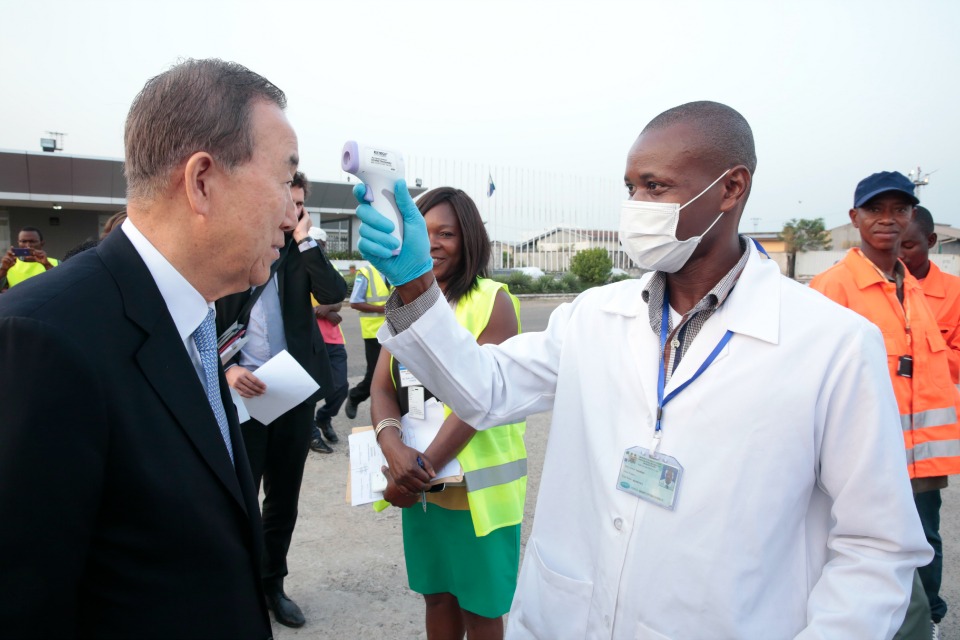Ebola: The focus must remain on getting to zero cases
Statement by Ambassador Shearman of the UK Mission to the UN, at the General Assembly’s Meeting on Ebola

Thank Mr President, and thank you for convening this meeting which is extremely helpful. Thank you of course to the Secretary-General for his remarks. I would also like to thank the Special Representative Mr Ahmed and Special Envoy Doctor Nabarro for their briefings. And more broadly the United Kingdom would like to pay tribute to their work and the leadership they are demonstrating in the response to Ebola.
Mr President,
It’s of course good news that the heroic efforts of the people and governments of the affected countries, with support from international partners, are turning the tide of the battle against the scourge of Ebola. But the recent spikes in reported cases remind us of the need for constant vigilance. We have to guard against complacency. The focus must remain on getting to zero cases. Planning for recovery is important but must not distract from this immediate priority.
As rates of infection decline, the nature and needs of the response are shifting but the challenges are not decreasing. We very much endorse the approach set out by the Special Representative and Special Envoy in the push to zero cases: increased surveillance, active case finding and management, rigorous contact tracing and social mobilisation are all essential.
Doctor Nabarro spoke of commitment, so I should say the UK remains committed to stay in the course, particularly in Sierra Leone where we have been contributing to support for the government’s efforts. As the United Kingdom we have committed a package of support which is worth somewhere around £325 million or about half a billion dollars, including the deployment of hundreds of personnel from our national health service and our military.
We will continue to work alongside the governments and other international partners to defeat the outbreak, to hunt the disease down at district level and to continue our support to the nationally coordinated efforts. We agree with others who said the last mile on the road to zero will be a bumpy one and it will be vital that the UN has the necessary high-quality human resource and leadership on the ground to help ensure zero is reached.
Looking ahead Mr President, the UK sees three key challenges: first as I have said, maintaining the political focus and flow of resources necessary to get to zero; Secondly, planning and delivering a seamless, coordinated transition; And three, achieving a safe, early and also long-term recovery.
Let me say a couple of things on the transition and recovery if I may. The countries affected by the crisis, with support from the United Nations, the World Bank, the European Union, the African Union and other partners, have a crucial opportunity ahead to develop and deliver a coordinated vision for recovery, starting with the Brussels Conference on 3 March.
We look forward to seeing the Ebola Recovery Assessments identify clear, achievable priorities for recovery. And we hope these priorities will support the governments in the region in establishing new ways of working with their citizens and with donors as well, of course, to focus on transparency and accountability in order to strengthen systems and capacities. The international community should support a recovery that builds resilience to ensure this crisis never happens again.
Mr President,
The United Nations will have a role in that recovery, an important role. There is a need for a strong UN leadership in country to help ensure that the plans for transition and recovery are delivered effectively. As UNMEER phases out, the UK believes it will be essential that UN Agencies and Country Teams are ready to deliver both residual work on the response and on recovery, in line with their comparative advantages and the needs in their respective countries. Joint planning and collaborative working with governments in the region and other partners will be essential to ensure that the move to transition and recovery is done in a safe manner and in no way jeopardises the ongoing efforts to eradicate the disease.
So in conclusion Mr President, we must get to zero cases and we need continued effort and vigilance to achieve that. The UK is fully committed to that struggle. At the same time we must turn the devastation this disease has brought into an opportunity. First in the countries concerned, to build greater resilience, a strong economic recovery and more effective institutions. And secondly as others have said, internationally we must learn the lessons to ensure that we are better equipped to respond to future international health crises, so that the tragic history we have seen play out in West Africa does not repeat itself, either in the region or elsewhere.
Thank you Mr President.